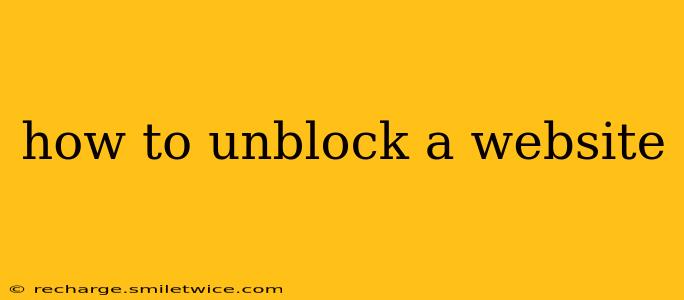Many websites are blocked for various reasons, from parental controls to geographical restrictions. This guide explores multiple methods to unblock websites, explaining their advantages and disadvantages. We'll cover techniques ranging from simple browser tweaks to more advanced solutions. Remember that circumventing restrictions imposed by your workplace or school may violate their policies.
Why is My Website Blocked?
Before we delve into unblocking methods, understanding why a website is blocked is crucial. Common reasons include:
- Parental Controls: Software or router settings filter inappropriate content.
- Network Restrictions: Workplaces, schools, or internet service providers (ISPs) block access to certain sites for productivity, security, or legal reasons.
- Government Censorship: Some countries restrict access to websites deemed harmful or subversive.
- Geographic Restrictions: Content providers might limit access based on your location.
How to Unblock a Website: Methods and Solutions
Here are several ways to bypass website blocks, categorized for clarity:
1. Using a VPN (Virtual Private Network)
A VPN is arguably the most effective method. A VPN masks your IP address, making it appear as though you're browsing from a different location. This is particularly useful for bypassing geographic restrictions or circumventing censorship.
Advantages: Strong security, bypasses most blocks, protects your online privacy. Disadvantages: Can be costly (paid services offer better speed and security), some free VPNs are unreliable or log your activity, can slightly reduce browsing speed.
2. Using a Proxy Server
Similar to a VPN, a proxy server routes your internet traffic through an intermediary server, masking your IP address. However, proxies generally offer less security than VPNs.
Advantages: Relatively simple to set up, some free proxy services are available. Disadvantages: Less secure than VPNs, slower speeds, potential privacy risks with free proxies.
3. Using a Tor Browser
Tor (The Onion Router) is a free and open-source browser that routes your traffic through multiple servers, enhancing your anonymity. It's particularly effective for accessing websites blocked by censorship.
Advantages: Excellent anonymity and privacy, bypasses many blocks. Disadvantages: Significantly slower browsing speeds, can be complex for novice users, some websites might not function correctly.
4. Checking Your Router Settings (For Parental Controls)
If the block is due to parental controls on your home network, you'll need to access your router's configuration page (usually via a web browser by typing your router's IP address into the address bar). Look for settings related to parental controls, content filtering, or website blocking. You may need the router's administrator password.
Advantages: Simple if you know your router's settings. Disadvantages: Requires administrator access, won't work for blocks imposed by ISPs or workplaces.
5. Clearing Your Browser Cache and Cookies
Sometimes, a website might appear blocked due to cached data or outdated cookies. Clearing your browser's cache and cookies can resolve this issue. The specific steps vary slightly depending on your browser (Chrome, Firefox, Safari, etc.).
Advantages: Quick and easy to try. Disadvantages: Won't work for most types of website blocks.
6. Using a Different Browser or Device
In rare cases, the block might be specific to your browser or device. Trying a different browser (e.g., switching from Chrome to Firefox) or using a different device (e.g., your phone instead of your computer) could help.
Advantages: Simple and quick workaround. Disadvantages: Not a reliable solution for most block types.
Frequently Asked Questions (FAQs)
Is it illegal to unblock websites?
It depends on the context. Circumventing parental controls in your home is unlikely to be illegal, but bypassing restrictions at work or school could violate their policies and lead to disciplinary action. Bypassing government censorship can have legal ramifications depending on the country's laws.
Which method is the safest?
VPNs generally provide the best combination of security and effectiveness. Using reputable, paid VPN services is recommended for enhanced privacy and security.
Are free VPNs or proxies safe?
Many free VPNs and proxies log your activity or inject malware, posing significant privacy and security risks. Use them with extreme caution, if at all.
Can I unblock all websites with these methods?
No. Highly sophisticated blocks implemented by governments or large organizations might be difficult or impossible to bypass using these common methods.
This guide provides a range of solutions to help unblock websites. However, remember to always respect the restrictions in place and be mindful of the potential legal and security implications of circumventing website blocks. Choose the method that best suits your needs and always prioritize your online safety and privacy.
